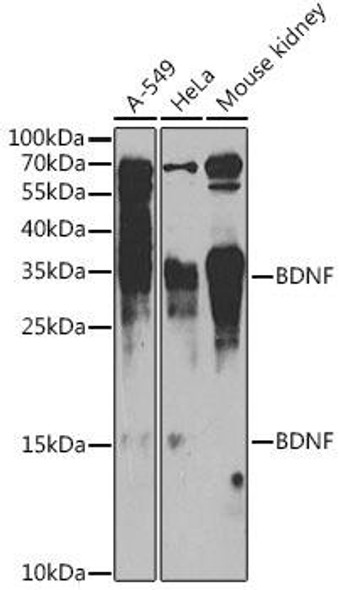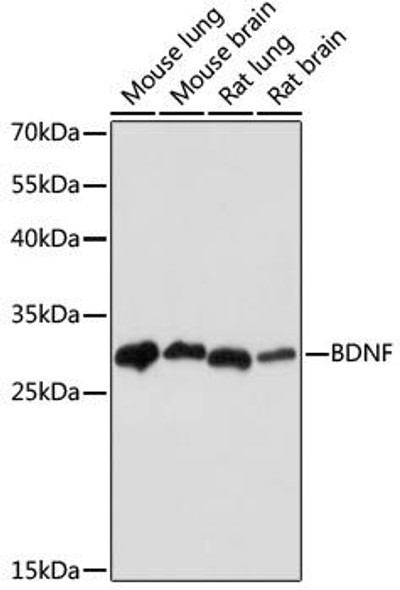Cell Biology Antibodies 17
Anti-BDNF Antibody (CAB4873)
- SKU:
- CAB4873
- Product Type:
- Antibody
- Antibody Type:
- Monoclonal Antibody
- Reactivity:
- Human
- Reactivity:
- Mouse
- Reactivity:
- Rat
- Host Species:
- Rabbit
- Isotype:
- IgG
- Synonyms:
- ANON2
- Synonyms:
- BULN2
- Research Area:
- Cell Biology
Description
| Product Name: | BDNF Rabbit mAb |
| Product Code: | CAB4873 |
| Size: | 20uL, 50uL, 100uL |
| Synonyms: | ANON2, BULN2 |
| Applications: | WB, IF |
| Reactivity: | Human, Mouse, Rat |
| Host Species: | Rabbit |
| Immunogen: | A synthesized peptide derived from human BDNF |
| Applications: | WB, IF |
| Recommended Dilutions: | WB 1:500 - 1:2000 IF 1:50 - 1:200 |
| Reactivity: | Human, Mouse, Rat |
| Positive Samples: | THP-1, PC-3, Rat liver |
| Immunogen: | A synthesized peptide derived from human BDNF |
| Purification Method: | Affinity purification |
| Storage: | Store at -20°C. Avoid freeze / thaw cycles. Buffer: PBS with 0.02% sodium azide, 0.05% BSA, 50% glycerol, pH7.3. |
| Isotype: | IgG |
| Sequence: | Email for sequence |
| Gene ID: | 627 |
| Uniprot: | P23560 |
| Cellular Location: | Secreted |
| Calculated MW: | 28kDa |
| Observed MW: | 15KDa/28KDa |
| UniProt Protein Function: | BDNF: During development, promotes the survival and differentiation of selected neuronal populations of the peripheral and central nervous systems. Participates in axonal growth, pathfinding and in the modulation of dendritic growth and morphology. Major regulator of synaptic transmission and plasticity at adult synapses in many regions of the CNS. The versatility of BDNF is emphasized by its contribution to a range of adaptive neuronal responses including long-term potentiation (LTP), long-term depression (LTD), certain forms of short-term synaptic plasticity, as well as homeostatic regulation of intrinsic neuronal excitability. Defects in BDNF are a cause of congenital central hypoventilation syndrome (CCHS); also known as congenital failure of autonomic control or Ondine curse. CCHS is a rare disorder characterized by abnormal control of respiration in the absence of neuromuscular or lung disease, or an identifiable brain stem lesion. A deficiency in autonomic control of respiration results in inadequate or negligible ventilatory and arousal responses to hypercapnia and hypoxemia. CCHS is frequently complicated with neurocristopathies such as Hirschsprung disease that occurs in about 16% of CCHS cases. Belongs to the NGF-beta family. 5 isoforms of the human protein are produced by alternative promoter. |
| UniProt Protein Details: | Protein type:Secreted, signal peptide; Cell development/differentiation; Secreted; Cytokine Chromosomal Location of Human Ortholog: 11p13 Cellular Component: extracellular space; synaptic vesicle; mitochondrial crista; perinuclear region of cytoplasm; cytoplasmic membrane-bound vesicle; cytoplasm; dendrite; extracellular region; terminal button; perikaryon Molecular Function:growth factor activity; neurotrophin TRKB receptor binding Biological Process: circadian rhythm; axon guidance; mechanoreceptor differentiation; behavioral fear response; mitochondrial electron transport, NADH to ubiquinone; regulation of neuron differentiation; axon extension; response to hormone stimulus; positive regulation of long-term neuronal synaptic plasticity; response to vitamin A; negative regulation of neuroblast proliferation; ureteric bud development; dendrite development; regulation of retinal cell programmed cell death; feeding behavior; negative regulation of neuron apoptosis; response to electrical stimulus; negative regulation of synaptic transmission, GABAergic; inner ear development; response to food; nervous system development; chronic inflammatory response; response to light intensity; neuron recognition; regulation of short-term neuronal synaptic plasticity; learning; regulation of axon extension; negative regulation of striated muscle development; positive regulation of peptidyl-serine phosphorylation; positive regulation of synaptogenesis; axon target recognition; response to hyperoxia; glutamate secretion; response to hypoxia; response to fluoxetine; nerve development; response to activity; positive regulation of neuron differentiation; regulation of excitatory postsynaptic membrane potential; neurite morphogenesis; transmembrane receptor protein tyrosine kinase signaling pathway; gamma-aminobutyric acid signaling pathway Disease: Bulimia Nervosa, Susceptibility To, 1; Obsessive-compulsive Disorder; Bulimia Nervosa, Susceptibility To, 2; Central Hypoventilation Syndrome, Congenital |
| NCBI Summary: | The protein encoded by this gene is a member of the nerve growth factor family. It is induced by cortical neurons, and is necessary for survival of striatal neurons in the brain. Expression of this gene is reduced in both Alzheimer's and Huntington disease patients. This gene may play a role in the regulation of stress response and in the biology of mood disorders. Multiple transcript variants encoding distinct isoforms have been described for this gene. [provided by RefSeq, Jan 2009] |
| UniProt Code: | P23560 |
| NCBI GenInfo Identifier: | 114900 |
| NCBI Gene ID: | 627 |
| NCBI Accession: | P23560.1 |
| UniProt Secondary Accession: | P23560,Q598Q1, Q6DN19, Q6YNR2, Q6YNR3, Q9BYY7, Q9UC24 A7LA85, A7LA92, D3DQZ2, |
| UniProt Related Accession: | P23560 |
| Molecular Weight: | 31,116 Da |
| NCBI Full Name: | Brain-derived neurotrophic factor |
| NCBI Synonym Full Names: | brain-derived neurotrophic factor |
| NCBI Official Symbol: | BDNF |
| NCBI Official Synonym Symbols: | ANON2; BULN2 |
| NCBI Protein Information: | brain-derived neurotrophic factor; abrineurin; neurotrophin |
| UniProt Protein Name: | Brain-derived neurotrophic factor |
| UniProt Synonym Protein Names: | Abrineurin |
| Protein Family: | BDNF/NT-3 growth factors receptor |
| UniProt Gene Name: | BDNF |
| UniProt Entry Name: | BDNF_HUMAN |






